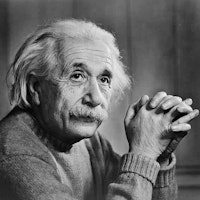It is enough for me to contemplate the mystery of conscious life perpetuating itself through all eternity… and to try humbly to comprehend an infinitesimal part of the intelligence manifested in nature.
It is enough for me to contemplate the mystery of conscious life perpetuating itself through all eternity… and to try humbly to comprehend an infinitesimal part of the intelligence manifested in nature.
Albert Einstein

The Mystery of Conscious Life
Topic: Life Beyond Death & the Spirit World
It is enough for me to contemplate the mystery of conscious life perpetuating itself through all eternity, to reflect upon the marvelous structure of the universe which we dimly perceive, and to try humbly to comprehend an infinitesimal part of the intelligence manifested in nature.
Albert Einstein, born on 14 March 1879 and passing away on 18 April 1955, stands as one of the most renowned theoretical physicists in history. Best known for his groundbreaking special and general theories of relativity, his scientific endeavors spanned a multitude of areas within the field of physics. Amongst his numerous accolades, he was awarded the Nobel Prize in physics for his elucidation of the photoelectric effect—a phenomenon that expanded the horizons of quantum theory.
Einstein's journey, however, wasn't merely defined by scientific discoveries, but by the myriad challenges he overcame across various dimensions of his life. In his spiritual journey, he grappled with the concepts of God and universe. Socially, he navigated the complexities of his time—facing the rise of anti-Semitism, experiencing exile from his homeland due to Nazi oppression, and advocating for civil rights, disarmament, and global peace. These adversities only strengthened his resolve and underscored his resilience.
Beyond his professional accomplishments, Einstein's life was enriched by a tapestry of relationships and dialogues with luminaries from diverse fields. He engaged in profound conversations on the nature of reality with the likes of the Indian poet Rabindranath Tagore, discussed the principles of non-violence with Mohandas Gandhi, and deliberated on humanitarian issues with Albert Schweitzer. Furthermore, his camaraderie with fellow scientists and physicists provided a fertile ground for intellectual exchanges, fostering an environment of collaboration and innovation during one of the most exciting epochs in scientific history.
What I Believe
Einstein, Albert. An Einstein Encyclopedia. Edited by Alice Calaprice et al., Princeton University Press, 2015, p. xxiii [Albert Einstein, "What I Believe," Forum and Century 84, #4 (Oct. 1930)] pp. 193-194.

Albert Einstein
Resources
Copyright © 2017 – 2026 LuminaryQuotes.com About Us

Albert Einstein, “What I Believe”
Paul Davies
Additional Albert Einstein Quotes